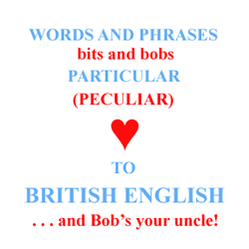English spelling often makes no sense at all. It makes me wish there was no Hooked on Phonics for the English language. How can it help with words like rhythm or the difference between tough vs. bough? English is full of rules that have no end of exceptions-why have rules in English anyway, then?

English Words with Odd Spellings
English is full of words whose spelling make no sense compared to the way they are pronounced. Rarely are words phonetically spelled.
That Spoken Word Is "Spelt,-I Meant- "Spelled" How?
That Written Word is Pronounced How?
I have written a fair amount of poetry. Some of it has rhymed and some has not. When people ask me about the styles of poetry I write and why I enjoy writing it, I talk about rhyme and rythm... er...rythem..er......rythym ...better look it up. R-H-Y-T-H-M. Rhythm. Huh? That does not make sense. And how come I have no trouble with rhyme? Do I simply use that word more often?
But then, why should I be surprised when English has so many exceptions to rules, silent letters, and words that with one or two different letters at the beginning of an otherwise identical list of words sound entirely different? Can you say "tough," "though," "through," and "bough?" Despite the fact that music is a huge factor in my life, I don't think I will ever be able to spell "rhythm" without looking it up first. Oh, and have I mentioned that I minored in English in University? In fact, I was originally going to major in English and minor in Psychology before I decided to switch these subjects.
I was taught to read with the whole word method by Mom using flashcards-long before I entered kindergarten. How can Hooked on Phonics ever work for English speakers? It can't, properly, and I blame this phonic learning for all the trendy spellings such as "lite," and "nite." English is actually a very difficult language to learn to speak and write, and I cannot imagine trying to learn it as a second language. Personally, I think Hooked on Phonics should be used only with Romance languages where vowel pronunciation is essentially constant. Punctuation marks will tell you how to pronounce a word in French or Italian-not in English.
Of course, the oddest English word spelling is "subpoena"-the court summons you are handed in person to notify you officially that you are wanted to testify in court as a witness for either a criminal case or a civil case. The spelling makes it look like it should be pronounced as "sup-eon-ah" or that the definition is some sort of Latin sub-species of the peony flower. In my opinion, this word should be spelled as s-u-p-i-n-a with its proper pronunciation.
Meanwhile, the oddest English-language place name in North America is Arkansas. That is "Are-Can-Saw" to you whole word readers. Hooked on Phonics will insist that Arkansas should be pronounced as "Are-Can-Sus"-otherwise known as "Our Kansas." No need to be confused with "Your Kansas" or "Their Kansas." And be sure you use the correct "their" "there" or "they're" with Kansas, too.
Of course, there are times when you are typing that you accidently hit the wrong letters. I am not talking about people who confuse "there" "their" or "they're." Rather I am talking about typing out a word that is spelled correctly, but it isn't the word you meant to type. I type with one hand, so this is often a problem for me. "R" and "T" are next door to each other and I was talking in the forums on another website one day about the author Lillian Jackson Braun who had just died. I gushed about how much I loved reading Braun because I adore "c-a-r-s."
Oops! That was supposed to read "c-a-t-s." This is why it is necessary to read your writing out loud as part of your editing process. You cannot rely simply on spell check. What did people do before computers? That's right, they used the dictionary.
In conclusion:
*Some words have odd spellings, making them difficult to spell even for native English speakers. Trendy spelling is now replacing correct spelling. That is fine for "texting" -apparently this is not a correctly spelled word as it is underlined in red for me-where you have a small number of characters you are allowed. However, it is not appropriate for a term paper or work you hand in to your boss.
*Hooked on Phonics should not be used for native English speakers as it produces bad spellers.
*Spell check is an important tool. However, it cannot be your only editing tool. You need to read your test aloud to make sure you have not written the wrong but correctly spelled word.
English Correctly Spelled?
The English Dictionary
 | Merriam-Webster's Collegiate Dictionary, 11th Edition This version of Merriam-Webster's Collegiate Dictionary, Eleventh Edition, is burgundy leather-look, and thumb-notched. For this new edition, AmericaÂ’s largest staff of lexicog... |
 | A Concise Anglo-Saxon Dictionary: For The Use Of Students (1916) This book is a facsimile reprint and may contain imperfections such as marks, notations, marginalia and flawed pages. |
You might also like
British English Phrases, Idioms, and Expressions (Letters A-C)By Mira at Wizzley. Some of my favorite words and phrases that are particular...



 Hitchcock's British Movie Career Before Hollywoodon 05/21/2012
Hitchcock's British Movie Career Before Hollywoodon 05/21/2012
 Favourite Hitchcockian Films Alfred Never Directedon 05/08/2012
Favourite Hitchcockian Films Alfred Never Directedon 05/08/2012
 My Favourite Columbo Episodeson 04/30/2012
My Favourite Columbo Episodeson 04/30/2012
 How to Be Cool in Hollywood: Actors with Cool Nicknameson 04/28/2012
How to Be Cool in Hollywood: Actors with Cool Nicknameson 04/28/2012


Comments
Yes, English is a pretty crazy language I agree but Welsh is even stranger. My father is pretty good with languages but he gave up in disgust after trying to learn Welsh. It has mutations that change the first letters of a word so Cardiff which is Caerdydd in Welsh, changes to Nghaerdydd after yn ("in") which itself changes to yng before a C that mutates. That's just the nasal mutation. You have to learn the Soft and Aspirate mutations as well.
Actually, if you're talking about grapes and flying, you are correct. It's Concord, New Hampshire that is the oddball.
Ragtimelil-Thanks for these examples of confusing spelling/pronouncing pairs.I hadn't heard of the Concord difference. We certainly pronounce Concord as Con-cord here in B.C. when talking about grapes and flying
Coming from New England, we have Concord which is pronounced Ca'-curd, not Con-cord. We can always spot an announcer from out of state. And Worcester - pronounced Wuu-ster. Just to make things confusing.
Thanks, Vicki. There are plenty of place names examples around the world, but Arkansas is the first place I think of in the USA.
Very interesting, Flora. I love language! I thought it interesting that you mentioned Arkansas, as that is where I'm from! Great article!
Hello 2uesday.
Sorry I took so long to reply. I have been very busy lately. Thanks for your thoughts on the gender neutrality of English, similar sounding words, and the texting effect on our language.
Thanks, Katie. I learned more about languages other than my mother tongue by singing them, even though this includes French which I studied in high school. Somehow singing in other languages rather than an English translation of a foreign language-made to fit the rhythm - has always been preferable as a singer.
This is so true, the English language is probably one of the hardest to learn. Learning Spanish I realized this with it's more simplistic usage of words. The English language may very well be the reasons we have so many bad spellers, they get all the tenses and varying words mixed up. Hmmm great article.
Vinaya -
1. I admire people who try to pronounce English when English is not their native language. I don't know how ESL people do it without moving to a country that speaks only English.
2. Thanks for the kind thoughts and sharing the experiences of your own family's cats and their deaths. We do indeed have common grief to share. It makes easier to share grief, I believe.